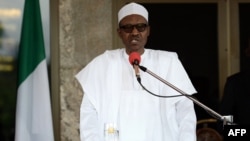Nigeria has a federal budget following months of debate between President Muhammadu Buhari and lawmakers.
Officials are calling the new $30.4 billion spending plan the “Budget of Change.” The president signed the plan into law last month.
The measure includes money for roads, railroads, bridges and social services. Buhari said he hopes the spending plan will show Nigerians that their lawmakers can spend tax money wisely.
In the past, critics say, Nigerian lawmakers used the federal budget to steal public money.
Some political observers see the new budget as a step forward for responsible spending in Africa’s largest economy.
Dauda Garuba is with the Natural Resource Governance Institute, Nigeria. He said earlier budgets were filled with money that went directly to lawmakers. And some budgetary proposals were in need of more study.
Garuba said the months of negotiations between Nigeria’s national assembly and the president show this budget is different.
“The bulk of the fights you were maybe hearing was an attempt by people to say, ‘No, we cannot do this business as usual’ and others saying that, ‘OK, if you cannot do this business as usual, we have to do our thorough jobs,’” he added.
But other Nigerians say the budget includes money for projects where corruption was a problem in the past. In the past, they say, lawmakers have made profits when large amounts of public money are spent.
Oluseun Onigbinde helped create BudgIT, a group that examines public spending. He criticized lawmakers for giving $500 million to what have been called “constituency projects.” These projects are designed to help the districts of some lawmakers.
The spending “has nothing to do that has to do with core help for the people or maybe things that are sustainable,” he says. “It is just them [being loyal] to political party members and giving them what they feel they want to pass along.”
On the verge of recession
The Nigerian economy is close to entering a recession, partly because of the drop in oil prices last year.
Oil is Nigeria’s top export. A series of attacks on oil pipelines has caused production to drop by more than 500,000 barrels. This has weakened the economy even more.
Inflation has risen to almost 14 percent. The government recently raised fuel prices by almost 67 percent.
Yusuf Shamsudeen is a program officer at the Center for Democracy and Development. He said Nigerian lawmakers should not have approved spending $577 million on the national assembly when the economy is weak.
“This huge amount can be cut down to provide developmental projects to the citizens and address our economic problems,” he said.
Shamsudeen said the next step in judging the budget will be to see whether the money goes to the government programs it is supposed to.
I’m Christopher Jones-Cruise.
Chris Stein in Lagos reported this story for VOANews.com. Christopher Jones-Cruise adapted his report for Learning English. George Grow was the editor.
We want to hear from you. Write to us in the Comments Section, or visit our Facebook page.
______________________________________________________________
Words in This Story
bulk – n. most of something; the largest part of something
constituency – n. the people who live and vote in an area
district – n. an area established by a government for official government business
sustainable – adj. able to last or continue for a long time
address – v. to give attention to (something); to deal with (a matter, issue, problem, etc.)








